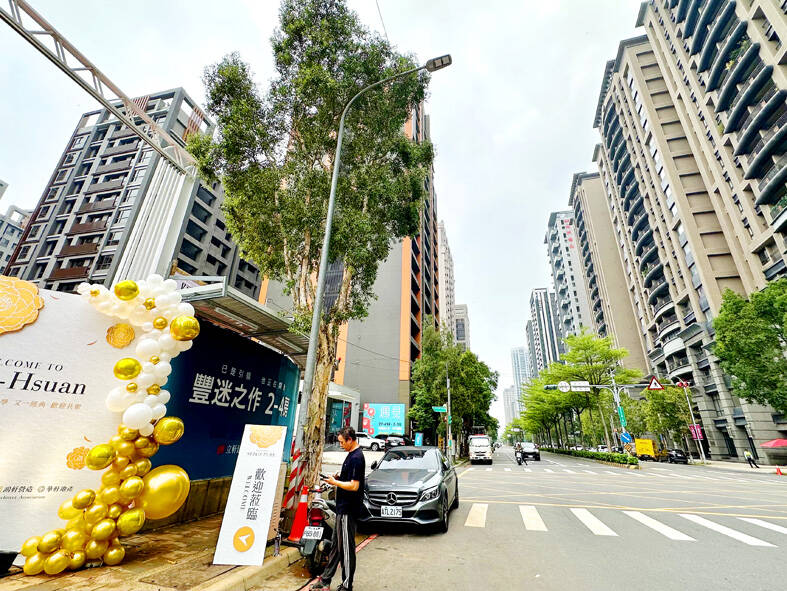Housing transactions in the first six months of this year soared 27 percent from a year earlier to 177,000 units, two separate surveys showed, despite steep price increases in some major urban centers.
Sinyi Realty Inc (信義房屋), Taiwan’s only listed broker, yesterday said that there was an increase in transactions for new and existing houses as buyer interest spiked.
More increases are expected, Sinyi Realty said.

Photo: Hsu Yi-ping, Taipei Times
The upbeat sentiment came even though home prices rose 4.8 to 17 percent in the six special municipalities — Taipei, New Taipei City, Taoyuan, Taichung, Tainan and Kaohsiung — as well as Hsinchu city and county, Sinyi research manager Tseng Ching-der (曾進德) said.
Prices in the Hsinchu area increased the most nationwide with a 17.1 percent jump in the first half, followed by Taoyuan (15.6 percent), Taichung (14.9 percent) and Kaohsiung (13.1 percent), the company said.
Sinyi Realty linked the surge in buying interest to an economic recovery and TAIEX rallies.
Taiwan’s exports expanded more than 10 percent in the first half and would gain pace in the high sales season for technology products, Tseng said.
At the same time, local stocks have repeatedly set new highs amid a global craze for artificial intelligence applications, he said.
Sinyi Realty expects challenges to arise, as the central bank last month raised the lenders’ reserve requirement ratio by 12.5 basis points and lowered the loan-to-value limit from 70 percent to 60 percent for second-home mortgages in the six special municipalities and Hsinchu.
Furthermore, the government and state-run banks have tightened reviews for first-home loan applications to root out dummy buyers and potential landlords, the realtor said.
Interest subsidies and other favorable lending terms are intended to help people buy first homes to meet self-occupancy needs, the Ministry of Finance has said, adding it would take action against those who contravene the rules.
A separate survey last week by Cathay Real Estate Development Co (國泰建設) showed that presale and new house projects in the April-to-June quarter more than doubled to NT$557.5 billion (US$16.97 billion) from three months earlier.
Selling prices averaged NT$530,300 per ping (3.3m2) nationwide, an increase of 6.7 percent from a quarter earlier, Cathay Real Estate Development said, adding that the 30-day sales rate climbed 5.22 percentage points to 22.12 percent.
Taiwan’s rapid economic growth lent support to the upturn in the presale and new housing market by measure of project volume, sales rates and selling prices, it said.
The gauge on price concessions widened 0.31 percentage points to 6.38 percent, still within a healthy range, it said.
Cathay Real Estate Development said that it is optimistic the improvement would continue, but warned that the central bank might introduce more credit controls to rein in the market.

SEMICONDUCTORS: The German laser and plasma generator company will expand its local services as its specialized offerings support Taiwan’s semiconductor industries Trumpf SE + Co KG, a global leader in supplying laser technology and plasma generators used in chip production, is expanding its investments in Taiwan in an effort to deeply integrate into the global semiconductor supply chain in the pursuit of growth. The company, headquartered in Ditzingen, Germany, has invested significantly in a newly inaugurated regional technical center for plasma generators in Taoyuan, its latest expansion in Taiwan after being engaged in various industries for more than 25 years. The center, the first of its kind Trumpf built outside Germany, aims to serve customers from Taiwan, Japan, Southeast Asia and South Korea,

Gasoline and diesel prices at domestic fuel stations are to fall NT$0.2 per liter this week, down for a second consecutive week, CPC Corp, Taiwan (台灣中油) and Formosa Petrochemical Corp (台塑石化) announced yesterday. Effective today, gasoline prices at CPC and Formosa stations are to drop to NT$26.4, NT$27.9 and NT$29.9 per liter for 92, 95 and 98-octane unleaded gasoline respectively, the companies said in separate statements. The price of premium diesel is to fall to NT$24.8 per liter at CPC stations and NT$24.6 at Formosa pumps, they said. The price adjustments came even as international crude oil prices rose last week, as traders

Taiwan Semiconductor Manufacturing Co (TSMC, 台積電), which supplies advanced chips to Nvidia Corp and Apple Inc, yesterday reported NT$1.046 trillion (US$33.1 billion) in revenue for last quarter, driven by constantly strong demand for artificial intelligence (AI) chips, falling in the upper end of its forecast. Based on TSMC’s financial guidance, revenue would expand about 22 percent sequentially to the range from US$32.2 billion to US$33.4 billion during the final quarter of 2024, it told investors in October last year. Last year in total, revenue jumped 31.61 percent to NT$3.81 trillion, compared with NT$2.89 trillion generated in the year before, according to

PRECEDENTED TIMES: In news that surely does not shock, AI and tech exports drove a banner for exports last year as Taiwan’s economic growth experienced a flood tide Taiwan’s exports delivered a blockbuster finish to last year with last month’s shipments rising at the second-highest pace on record as demand for artificial intelligence (AI) hardware and advanced computing remained strong, the Ministry of Finance said yesterday. Exports surged 43.4 percent from a year earlier to US$62.48 billion last month, extending growth to 26 consecutive months. Imports climbed 14.9 percent to US$43.04 billion, the second-highest monthly level historically, resulting in a trade surplus of US$19.43 billion — more than double that of the year before. Department of Statistics Director-General Beatrice Tsai (蔡美娜) described the performance as “surprisingly outstanding,” forecasting export growth